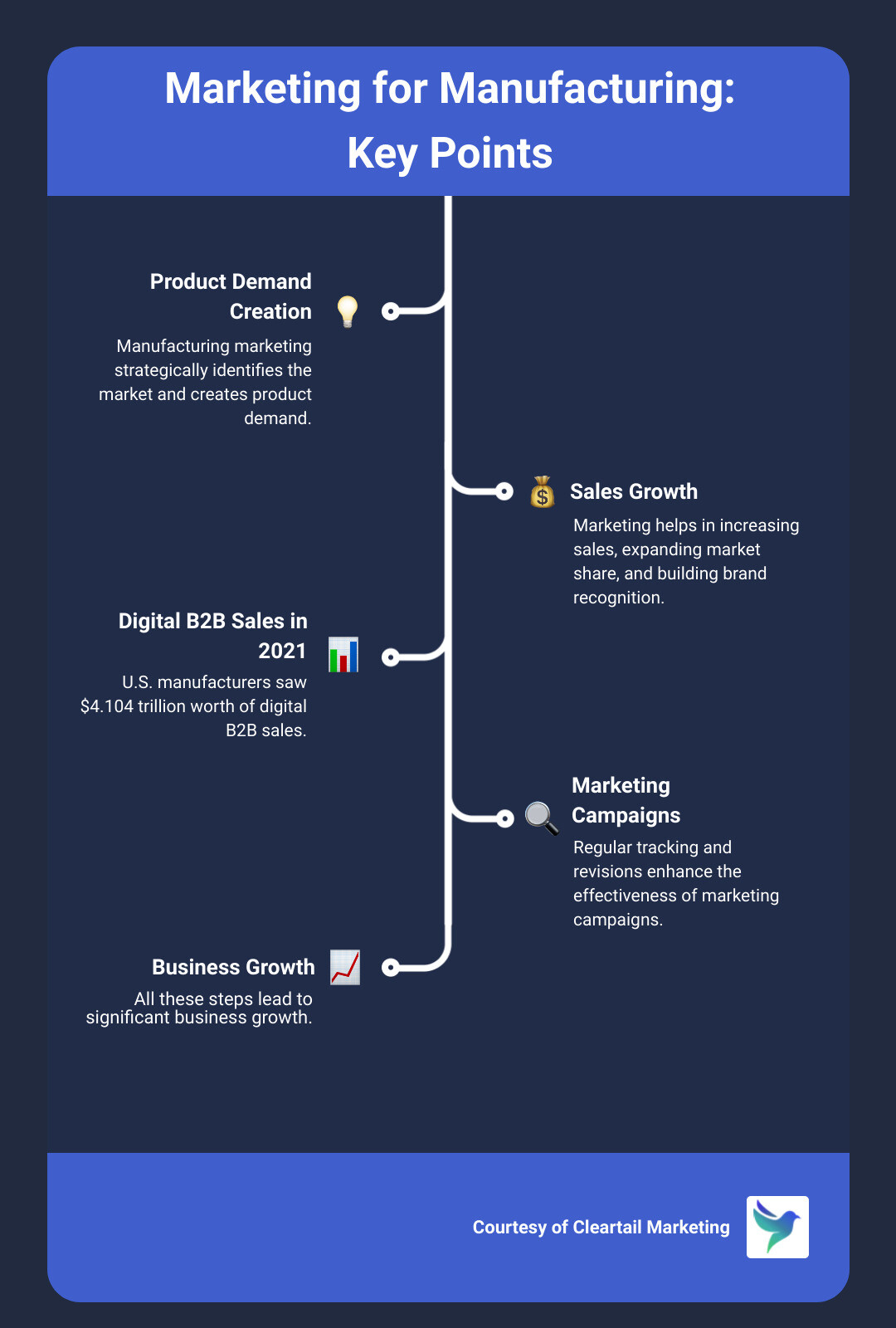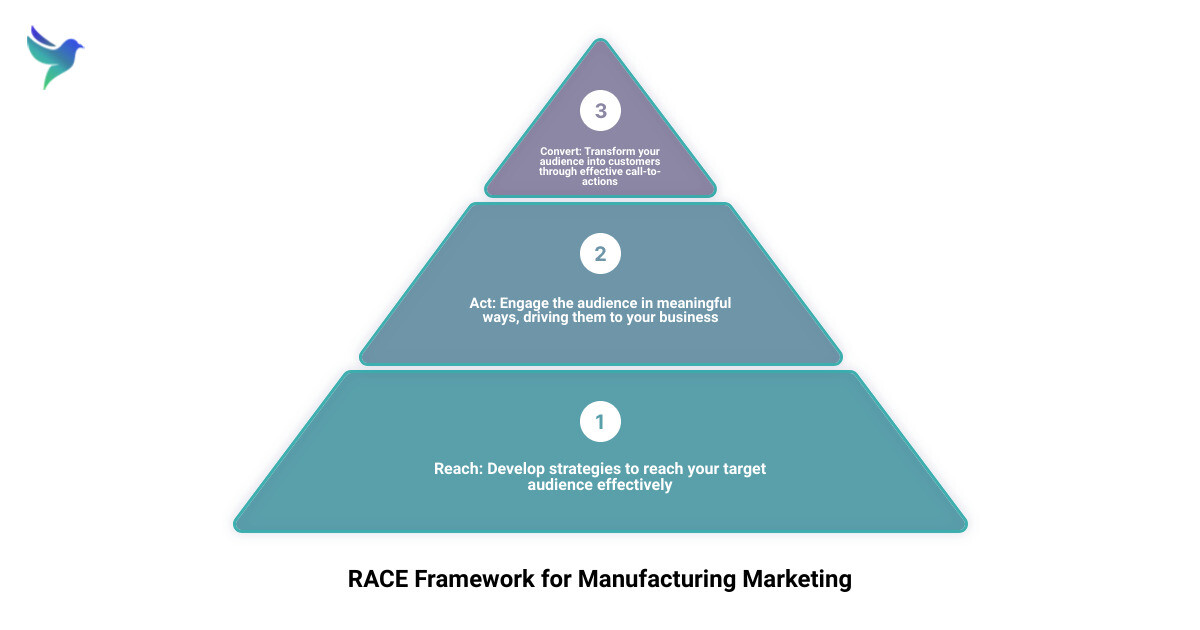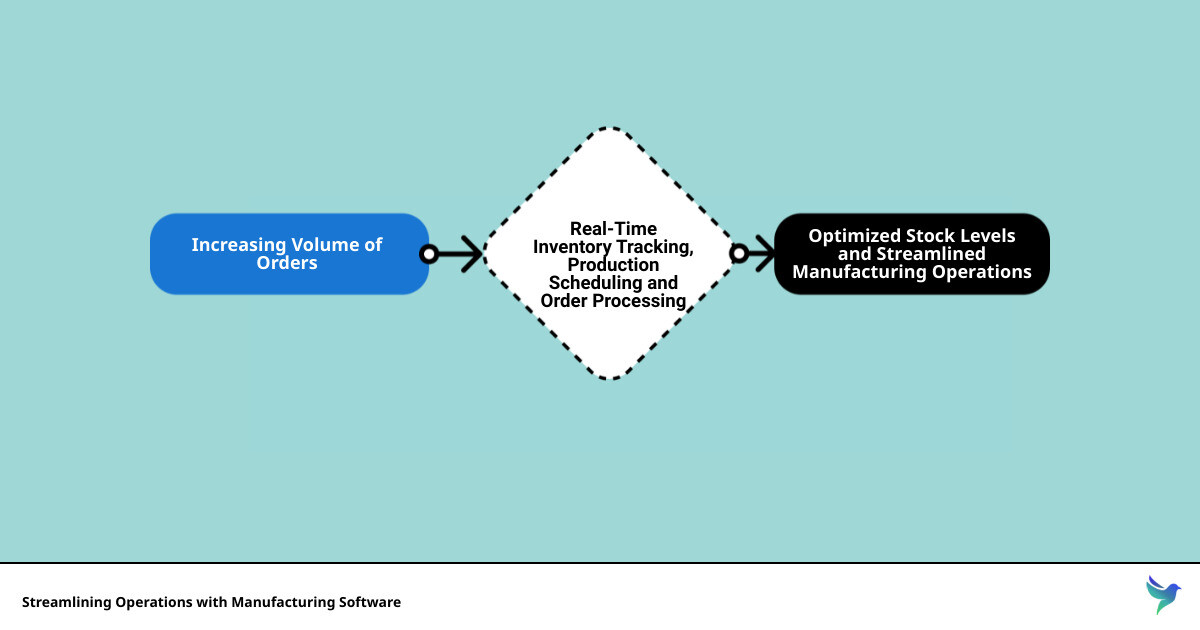Marketing has been splitting opinions for years. Is it the next best thing since the invention of the wheel, or is it a drain on resources that could better be used elsewhere? As a manufacturing business owner, you might find yourself floating between these two extremes. Regardless of your stance, understanding the value of marketing for manufacturing is critical for the future of your business.
Manufacturing marketing is not just about promoting a product but creating a demand for that product in a strategically identified market. It involves understanding your target market, getting your product positioning right, pricing it appropriately, and determining its promotion and distribution channels. All these factors combined help increase sales, expand market share, and build the brand recognition necessary for business growth.
The digital revolution has redefined this process. The manufacturing sector has seen an explosion in digital B2B sales, reaching a staggering $4.104 trillion in 2021 alone. While direct-to-consumer e-commerce sales are growing, they still represent a small fraction of the B2B market. It is therefore evident that the world of manufacturing has embraced digital marketing, and there’s no turning back.
To ensure success in this digital market, it is crucial to track the results of your marketing campaigns. This allows you to make adjustments and improvements, ensuring that your campaigns remain effective in driving demand and building relationships which are vital for repeat business and growth.
Key Points on the Importance of Marketing for Manufacturing:
* Manufacturing marketing creates product demand in a strategically identified market.
* It helps increase sales, expands market share, and builds brand recognition to achieve business growth.
* In 2021, U.S. manufacturers saw $4.104 trillion worth of digital B2B sales.
* Regular tracking and revisions enhance the effectiveness of marketing campaigns.

At Cleartail Marketing, we understand the crucial role that effective marketing plays in the success of manufacturing companies. We are dedicated to helping businesses like yours navigate the marketing landscape with customized strategies and innovative solutions. In the following sections, we delve deeper into the unique landscape of manufacturing marketing, and how you can leverage it to revamp your business.
Understanding the Manufacturing Marketing Landscape
In the bustling digital age, marketing for manufacturing has evolved significantly. Now, more than ever, manufacturers need to have their finger on the pulse of the latest marketing trends and strategies. Let’s unravel the complex landscape of manufacturing marketing and how you can harness its potential for your business.
The Role of a Manufacturer in Marketing

As a manufacturer, your role in marketing is far from mere production. Today, manufacturers are expected to be active participants in the marketing process. While traditionally, manufacturers have been sales-driven entities, the shift in business dynamics necessitates a more balanced approach, incorporating robust marketing strategies.
The role of a manufacturer in marketing extends to creating value to earn attention and trust, turning the knowledge of your experts into assets, and communicating regularly with your sales team. It’s no longer just about producing goods; it’s about establishing your brand, engaging with your audience, and positioning yourself as a leader in your industry.
The Unique Challenges of Marketing for Manufacturing
Manufacturers face some unique challenges in marketing. Unlike B2C companies, manufacturers often deal with complex, long-term buying processes involving multiple stakeholders. This complex scenario may sometimes lead to difficulties in reaching the target audience, generating quality leads, converting these leads into customers, creating compelling content, and measuring results.
Another common challenge is the traditional mindset of viewing marketing as an expense rather than an investment. This can limit the understanding and application of marketing strategies, constraining business growth. Therefore, shifting this mindset is essential for manufacturers to unlock the full potential of marketing.
The Power Shift from Seller to Buyer in Manufacturing Marketing
One of the most profound changes in the marketing landscape is the power shift from seller to buyer. Today’s buyers are well-informed and have a plethora of options at their fingertips. Thanks to the internet, they can easily research, compare, and choose between different products and suppliers. This shift necessitates a change in the way manufacturers approach marketing.
Instead of trying to push products onto buyers, manufacturers need to focus on pulling buyers in by providing valuable content, offering solutions to their problems, and building relationships based on trust and credibility. With this buyer-centric approach, manufacturers can better align their marketing strategies with the needs and expectations of modern buyers, driving sustainable business growth.
The manufacturing marketing landscape is complex and ever-changing. But with a clear understanding of your role, a willingness to overcome challenges, and a strategy that embraces the power shift from seller to buyer, you can make the most of your marketing efforts. Stay tuned as we delve deeper into how to develop a comprehensive marketing plan for your manufacturing business.
Developing a Comprehensive Marketing Plan for Your Manufacturing Business
Crafting a comprehensive marketing plan for your manufacturing business is akin to drawing a roadmap for success. It involves defining clear goals, understanding your audience, creating a strong brand, and leveraging digital marketing channels such as content marketing, social media, SEO, and PPC. Let’s explore these crucial steps in more detail.
Defining Your Marketing Goals and Key Performance Indicators
The first step in crafting a compelling marketing strategy is defining your marketing objectives. Whether you aim to increase brand awareness, generate quality leads, or boost customer loyalty, having clear, measurable, and achievable goals is vital.
Once you’ve defined your goals, the next step is to establish key performance indicators (KPIs). These are metrics that help gauge the performance of your marketing campaigns against your objectives. For instance, website traffic, leads generated, and sales converted can be useful KPIs to measure the success of your campaigns.
Understanding Your Target Market and Creating Buyer Personas
Understanding your target market is crucial to crafting a successful marketing strategy. At Cleartail Marketing, we recommend creating buyer personas — detailed profiles of your ideal customers based on demographics, interests, motivations, and behaviors. These personas can help you tailor your messaging and content to resonate with your target audience, increasing the effectiveness of your marketing efforts.
The Importance of a Strong Brand in Manufacturing Marketing
A solid brand is one of your company’s most important assets. It attracts new customers and keeps existing ones loyal. A strong brand identity, consistency across all touchpoints, and visibility are key elements of a strong brand. As your marketing partner, we’ll work with you to create a brand that’s as robust and reliable as the products you manufacture.
The Role of Content Marketing in Manufacturing
Content marketing plays a pivotal role in manufacturing marketing. By creating and distributing high-quality content, you can position your company as an industry expert and build trust with potential and existing customers. This can include blog posts, eBooks, infographics, and more. At Cleartail Marketing, we specialize in creating compelling content that drives traffic to your website and generates leads.
The Power of Social Media in Manufacturing Marketing
Social media platforms can provide a powerful way to engage with potential customers and build relationships that can lead to sales down the line. Whether it’s showcasing your products, sharing customer testimonials, or providing behind-the-scenes looks at your manufacturing process, social media can play a vital role in your marketing strategy.
The Importance of SEO and PPC in Manufacturing Marketing
Lastly, search engine optimization (SEO) and pay-per-click (PPC) advertising are crucial elements of any manufacturing marketing strategy. SEO helps your company rank higher in search results, increasing your visibility and attracting more organic traffic to your website. On the other hand, PPC allows you to bid on keywords that potential customers might use when looking for your products or services, placing your ads at the top of search results.
Our team at Cleartail Marketing has extensive experience in both SEO and PPC, ensuring your manufacturing business gets the visibility it deserves.
By following these steps, you’ll be on your way to crafting a marketing strategy that’s tailored to your manufacturing business’s specific needs and goals. In the next section, we’ll explore some innovative marketing strategies that can take your business to the next level.
Innovative Marketing Strategies for Manufacturing Businesses
Ready to supercharge your manufacturing marketing? Let’s delve into some innovative strategies that will revolutionize the way you approach marketing in the manufacturing industry.
Leveraging the RACE Framework for Manufacturing Marketing

RACE (Reach, Act, Convert, Engage) is a powerful framework that can help structure your manufacturing marketing strategy. This customer-centric framework is designed to optimize each stage of the customer lifecycle, from creating awareness to building loyalty.
First, we’ll help you create a comprehensive strategy to Reach your target audience, ensuring that your manufacturing business is capturing attention in the right places. Next, we’ll focus on encouraging your audience to Act – this involves interacting with your content, filling out forms, or viewing product demonstrations.
The Convert stage is all about turning these engaged prospects into customers. We’ll use strategies like lead scoring to identify the most sales-ready leads and prioritize your sales team’s efforts accordingly. Finally, the Engage stage is all about nurturing your customers, ensuring they become loyal advocates for your brand.
The Role of Inbound Marketing and Thought Leadership in Manufacturing
Inbound marketing is about creating valuable content that draws your audience to your website. This strategy is especially effective in the manufacturing industry, where prospective customers often spend a significant amount of time researching before making a purchase.
At Cleartail Marketing, we specialize in creating high-quality, SEO-optimized content that showcases your manufacturing expertise. We aim to position you as a thought leader in your field, demonstrating your knowledge and experience to potential customers.
The Power of Account-Based Marketing in Manufacturing
Account-Based Marketing (ABM) is a powerful strategy for manufacturing businesses targeting specific high-value accounts. Instead of casting a wide net, ABM focuses marketing resources on a defined set of target accounts, personalizing campaigns to resonate with each account.
We can help you identify key accounts, create personalized marketing campaigns, and measure the success of your ABM efforts. This approach can lead to higher ROI, as it’s tailored to engage those accounts most likely to result in significant revenue.
The Importance of Sales and Marketing Alignment in Manufacturing
In many organizations, sales and marketing operate in silos. However, aligning these two departments can significantly improve your manufacturing marketing efforts. When sales and marketing work together, they can create consistent messaging, share insights, and jointly celebrate wins.
At Cleartail Marketing, we believe in the power of alignment. We can help facilitate communication between your sales and marketing teams, ensuring that everyone is working towards the same goal.
The Role of Research Marketing in Manufacturing
Understanding your market is critical to successful manufacturing marketing. This involves researching your competitors, understanding your target audience, and staying up-to-date with industry trends.
We use a range of research marketing strategies to gain insight into your market. These insights can inform your marketing strategy, helping you to create content that resonates with your audience, identify opportunities for growth, and differentiate your manufacturing business from competitors.
In the next section, we’ll discuss how to implement these strategies and measure their success. But remember, effective marketing is not a one-size-fits-all approach. It’s about finding the strategies that resonate with your target audience and align with your business goals. Let us at Cleartail Marketing guide you through this journey of discovery and growth.
Implementing and Measuring Your Manufacturing Marketing Strategy
You’ve got your comprehensive marketing strategy in place. Now, it’s time to bring it to life and track its performance. This step is just as crucial as devising the plan — a strategy is only as good as its implementation and the results it produces.
Optimizing Your Owned Marketing Assets
Your marketing assets, including your website, blog, social media profiles, and email newsletters, are the cornerstones of your digital presence. They’re your online “real estate” where you can control the narrative and directly engage with potential customers. At Cleartail Marketing, we believe in making the most of these assets.
To optimize your website, consider factors like user experience, site speed, mobile compatibility, and of course, SEO. Your blog should be filled with valuable, relevant content that resonates with your audience and demonstrates your thought leadership in the manufacturing industry. Meanwhile, your social media profiles should be active, engaging, and consistently reflect your brand’s voice and values.
The Role of Marketing Technology and Automation Tools
With the plethora of marketing tasks you need to handle, technology is your ally. Marketing automation tools are designed to save businesses time and money while optimizing their campaigns for revenue growth.
At Cleartail Marketing, we’re big advocates for the use of automation tools like HubSpot, which gives you a clear, real-time view of your marketing funnel and sales pipeline. It not only creates transparency across teams but also frees up time by triggering different events and marketing flows automatically. From email marketing to social media campaigns, lead nurturing, and display ad retargeting, automation can handle it all.
Tracking Your Marketing Efforts and Evaluating Success
As the saying goes, “what gets measured, gets managed.” Tracking your marketing efforts helps you understand which strategies are working and which need tweaking. Key metrics to consider include cost per action (CPA), cost per lead (CPL), customer lifetime value (CLV), click-through rate (CTR), lead-to-customer conversion rate, and website conversion rate.
Multi-touch attribution is another vital metric. It assigns credit to each touchpoint in the customer journey, helping you understand which marketing channels are most effective at different stages.
At Cleartail Marketing, we place a strong emphasis on data-driven decisions. Our team of experts can help you set up comprehensive tracking systems and interpret the data to make informed decisions about your marketing strategy.
Addressing Common Problems in Manufacturing Marketing
While implementing your marketing strategy, you may encounter some common challenges. These may include maintaining a consistent brand voice across all platforms, creating engaging content, and staying abreast of the latest SEO and PPC trends.
Remember that marketing for manufacturing is a dynamic process. It’s important to stay flexible and ready to pivot when necessary. At Cleartail Marketing, we’re always ready to help you navigate these challenges and optimize your marketing efforts.
In conclusion, implementing and measuring your manufacturing marketing strategy is a crucial step towards achieving your business goals. With optimized marketing assets, the right technology and tools, and a keen eye on tracking and evaluating success, you’re well on your way to manufacturing marketing success.
Preparing Your Manufacturing Business for Increased Demand
As your marketing efforts start to pay off and you begin to see an uptick in demand for your products, it’s crucial to be prepared for the increased business volume. From ensuring adequate manufacturing processes and resources to integrating enterprise manufacturing software for streamlining operations, let’s dive into how you can ready your business for the imminent growth.
Ensuring Adequate Manufacturing Processes and Resources
As we at Cleartail Marketing often advise our clients, the success of your marketing efforts means little if you can’t meet the resulting demand. It’s a dream come true for any business owner to see a surge in demand, but without proper planning and resources, that dream can quickly turn into a nightmare.
To handle the increased demand, it’s vital that you have robust manufacturing processes in place. Make sure you have enough staff, raw materials, and space to meet your customers’ needs. This preparation includes everything from the production floor to the shipping department. Boost your production capacity if needed and ensure your supply chain can handle the increased load.
The Role of Enterprise Manufacturing Software in Streamlining Operations
As the volume of orders grows, so too does the complexity of your manufacturing operations. Having a reliable enterprise manufacturing software is key to managing this complexity efficiently.
At Cleartail Marketing, we recommend solutions like Katana, which offers a robust set of features to optimize your stock levels and streamline your manufacturing operations. With a real-time overview of your inventory and production processes, you can ensure that your operations run smoothly even as demand increases.
This software integrates seamlessly with popular business tools, syncing your information across all platforms. So whether you’re tracking inventory, scheduling production, or processing orders, you have all the information you need at your fingertips.

In conclusion, preparing for increased demand is an essential aspect of your overall manufacturing marketing strategy. By ensuring adequate manufacturing processes and resources and leveraging the right software, you can efficiently manage growth and turn your marketing success into business success. We at Cleartail Marketing are committed to assisting you on this journey, providing expert guidance and support every step of the way.
Conclusion: The Future of Marketing for Manufacturing
The future of marketing for manufacturing is bright and brimming with potential. As technology evolves and buyer habits change, so too must our marketing strategies. Manufacturers who understand this and adapt will be the ones to thrive in the coming years.
One thing is clear: the days of relying solely on word-of-mouth and traditional advertising are gone. Today’s manufacturing businesses must embrace digital marketing strategies, from SEO and content marketing to social media and email automation. These tactics are no longer nice-to-haves, but rather, essential components of a comprehensive marketing strategy.
The rise of B2B e-commerce also holds exciting possibilities for manufacturers. As U.S. manufacturers saw a total of $4.104 trillion worth of digital B2B sales in 2021, it’s evident that the future of marketing for manufacturing lies online.
What’s more, the shift from seller to buyer power is changing the game. Manufacturers must recognize this shift and adapt their strategies accordingly. This involves understanding who makes up the buying committee and creating value to earn their attention and trust.
At Cleartail Marketing, we believe that marketing is not just about promoting products. It’s about building relationships, providing value, and becoming a trusted resource for your customers. We’re here to help you navigate the evolving landscape of manufacturing marketing, offering a range of services from Search Engine Optimization (SEO) and Email Marketing to Pay-Per-Click Advertising (PPC) and Marketing Automation.
The future is digital, and the future of marketing for manufacturing is no exception. It’s time to embrace the technology and strategies that will propel your manufacturing business into a successful future. Are you ready to level up your marketing game and drive your manufacturing business to new heights? We’re here to help. Contact us at Cleartail Marketing today. We can’t wait to help you achieve your goals.
Remember, the future of marketing for manufacturing is not a destination, but a journey. And every journey begins with a single step. Let’s take that step together.




